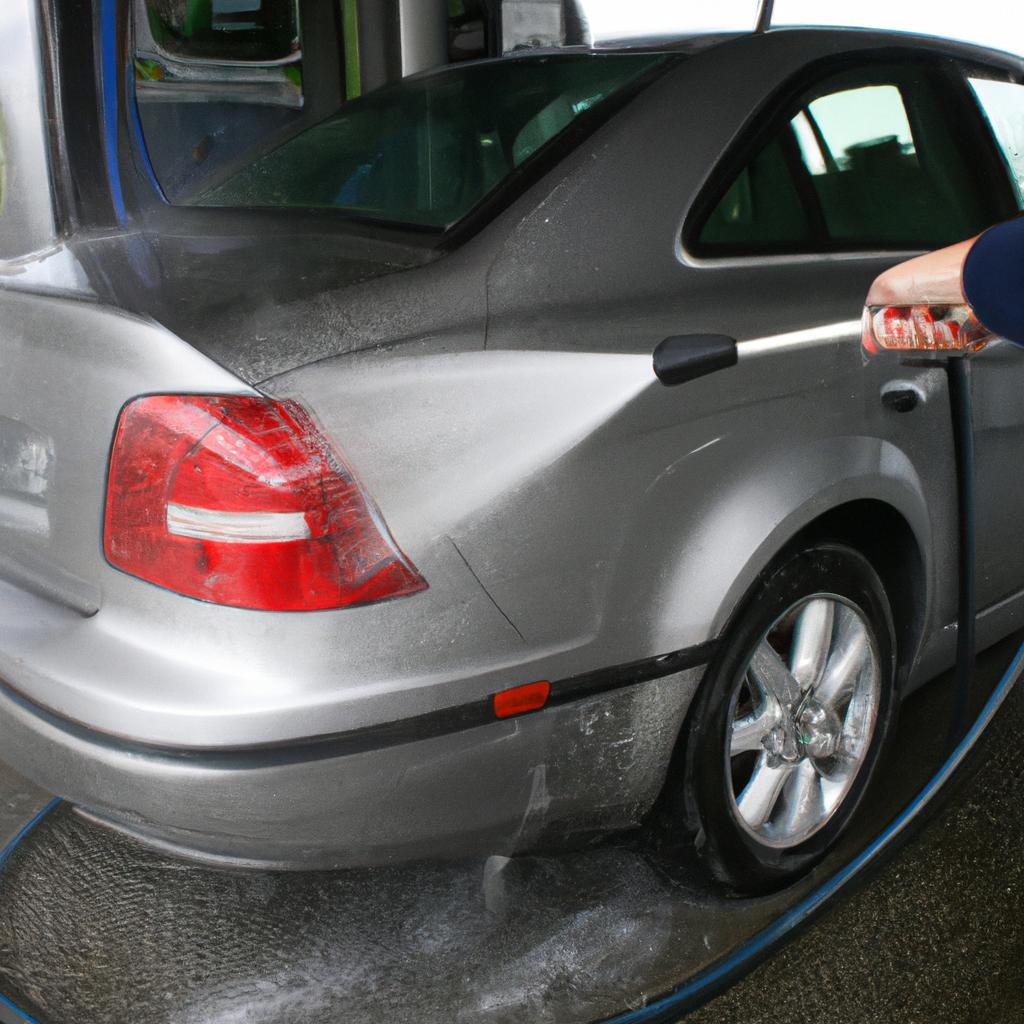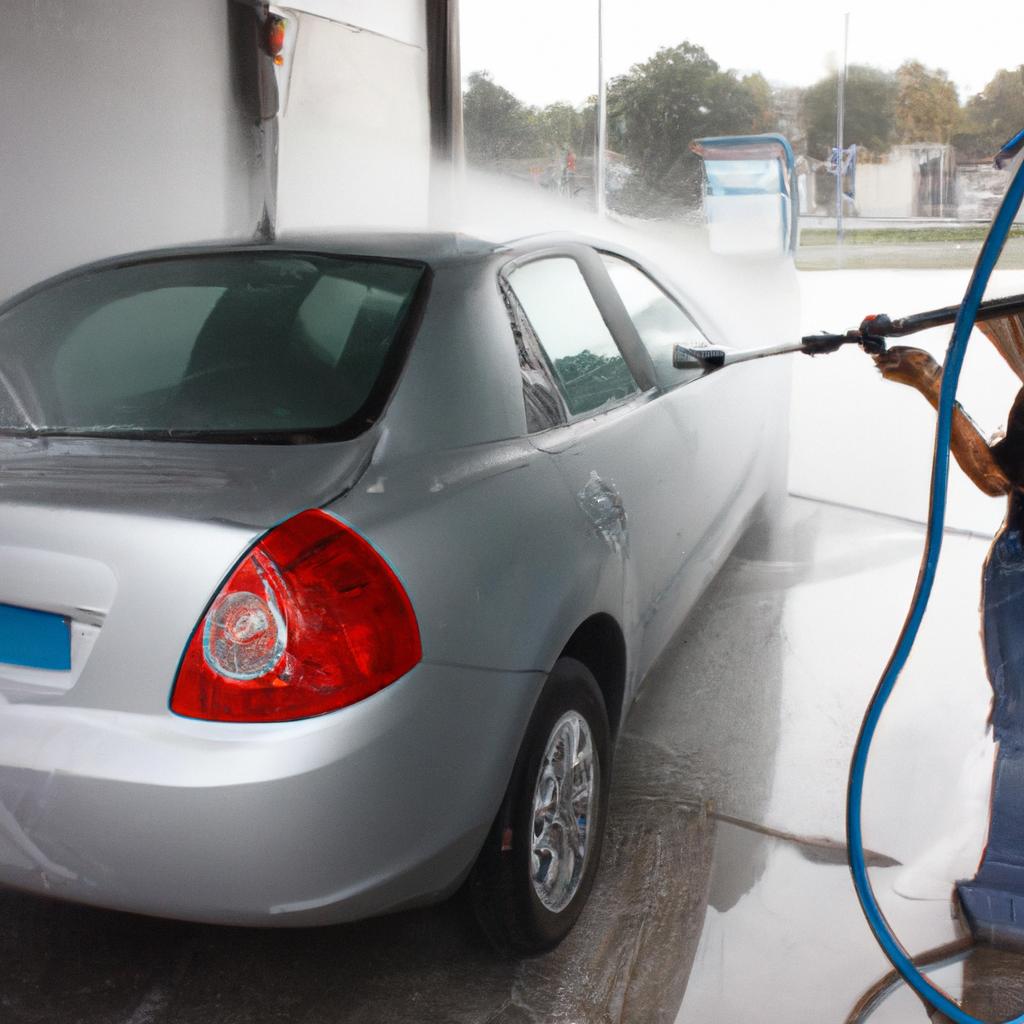Self-serve car wash bays have become a popular option for vehicle owners seeking convenience and cost-effectiveness. However, ensuring that these self-serve facilities function smoothly requires regular equipment maintenance. Without proper upkeep, the efficiency of the car wash bays can deteriorate over time, leading to frustrated customers and declining business. To illustrate this point, let us consider the hypothetical scenario of a bustling self-serve car wash facility in a suburban neighborhood. Despite its initial success in attracting customers with its ease-of-use and competitive pricing, the neglect of equipment maintenance gradually led to malfunctioning water pumps, clogged nozzles, and faulty payment systems.
In order to prevent such scenarios from becoming reality, it is crucial for car wash bay operators to understand the significance of routine equipment maintenance. Regular inspection and servicing not only enhance customer satisfaction but also extend the lifespan of essential components within the system. By adhering to manufacturer guidelines and implementing preventive measures such as cleaning filters regularly or lubricating moving parts, potential issues can be identified before they escalate into major problems that disrupt operations. Moreover, consistent monitoring allows operators to address minor faults promptly without causing significant downtime or additional expenses associated with replacing expensive machinery.
To summarize, maintaining optimal functionality in self-serve car wash b To summarize, maintaining optimal functionality in self-serve car wash bays is crucial for customer satisfaction and business success. Regular equipment maintenance, including inspection, cleaning, and servicing, can prevent malfunctions and extend the lifespan of essential components. By adhering to manufacturer guidelines and implementing preventive measures, operators can identify potential issues early on and address them promptly. This not only minimizes downtime but also prevents costly repairs or replacements in the long run.
Importance of Regular Equipment Inspections
Importance of Regular Equipment Inspections
Imagine this scenario: you have just arrived at a self-serve car wash bay, eager to clean your vehicle after a long road trip. As you approach the equipment, you notice that the soap dispenser is not working and the water pressure seems unusually low. Frustration sets in as you realize that this once convenient and efficient facility has fallen into disrepair.
Regular equipment inspections are vital for ensuring the smooth operation of self-serve car wash bays. By conducting routine assessments, potential issues can be identified early on and addressed promptly, minimizing downtime and maximizing customer satisfaction.
One key benefit of regular inspections is the prevention of costly repairs. Identifying minor problems before they escalate into major malfunctions can save both time and money in the long run. For instance, imagine if the malfunctioning soap dispenser in our earlier example had been inspected and repaired during a routine check-up. This would have prevented it from becoming an inconvenience for customers and potentially saved the business from losing revenue due to dissatisfied patrons.
To further emphasize the importance of regular inspections, consider the following bullet points:
- Ensures optimal performance: Regular inspections help maintain equipment efficiency by identifying wear and tear or any other factors affecting performance.
- Enhances safety standards: Timely identification and rectification of faulty components ensures a safe environment for both customers and employees.
- Maintains cleanliness standards: Properly functioning equipment contributes to maintaining high hygiene levels within self-serve car wash bays.
- Improves overall customer experience: A well-maintained facility creates a positive impression on visitors, leading to increased customer loyalty.
In addition to these benefits, keeping track of inspection records through documentation allows businesses to analyze trends over time, identify recurring issues, and develop preventive maintenance strategies accordingly.
To ensure uninterrupted service provision at self-serve car wash bays, proper cleaning and lubrication techniques must also be employed. These practices will be discussed in the subsequent section, focusing on how they contribute to equipment longevity and efficient operation.
Proper Cleaning and Lubrication Techniques
Having discussed the importance of regular equipment inspections, it is equally crucial to understand proper cleaning and lubrication techniques for self-serve car wash bays. By implementing these techniques, car wash owners can ensure optimal performance and longevity of their equipment.
Imagine a scenario where a self-serve car wash bay experiences frequent breakdowns due to improper cleaning and lack of lubrication. This leads to frustrated customers waiting in long queues or leaving without getting their vehicles cleaned. To avoid such situations, it is essential to follow specific guidelines when it comes to cleaning and lubricating self-serve car wash equipment.
Proper Cleaning Techniques:
-
Use non-abrasive cleaners: When cleaning the exterior surfaces of machines, always opt for non-abrasive cleaners that are specifically designed for use on automotive parts. Harsh chemicals or abrasive materials may cause damage or corrosion over time.
-
Regularly clean brushes and nozzles: The brushes and nozzles used in self-serve car wash bays tend to accumulate dirt, debris, and soap residue over time. Clean them regularly using mild detergent solutions and rinse thoroughly with water to maintain optimum functionality.
-
Inspect drainage systems: Clogged drainage systems can lead to standing water in the bays, posing safety hazards and affecting customer experience. Implement routine checks to identify any blockages in drains or pipes, ensuring smooth water flow during operations.
-
Maintain cleanliness of vacuums: In addition to washing bays, many self-serve car washes provide vacuum services as well. Ensure that vacuum nozzles are free from obstructions such as leaves or paper waste by periodically emptying collection bins and inspecting hoses for potential clogs.
Table – Benefits of Proper Cleaning Techniques (Emotional Appeal):
| Benefit | Description |
|---|---|
| Enhanced customer satisfaction | Clean equipment and a well-maintained environment improve the customer experience, leading to repeat business. |
| Reduced downtime | Regular cleaning minimizes breakdowns caused by dirt accumulation, reducing operational interruptions. |
| Protection against corrosion and damage | Proper cleaners help prevent rust formation or deterioration of machine components, extending their lifespan. |
| Improved overall appearance | Cleanliness creates an inviting atmosphere for customers, contributing to a positive brand image. |
Lubrication Techniques:
Proper lubrication is essential for ensuring smooth operation of self-serve car wash equipment. Consider the following guidelines when performing lubrication maintenance:
-
Use recommended lubricants: Refer to the manufacturer’s instructions or consult with industry professionals to determine the appropriate lubricants for each specific component. Using incorrect lubricants may lead to premature wear or malfunction.
-
Apply lubricant sparingly: Over-lubricating can attract dust and debris, resulting in build-up that interferes with proper functioning. Apply only the necessary amount as indicated by the manufacturer.
-
Create a regular schedule: Establish a routine for inspecting and lubricating moving parts such as chains, gears, and bearings. This prevents excessive friction and ensures optimal performance while minimizing potential breakdowns.
Conclusion Transition:
By implementing proper cleaning techniques and following recommended lubrication practices, self-serve car wash owners can maintain their equipment’s efficiency and prolong its lifespan. However, it is equally important to establish preventative maintenance schedules to address any potential issues before they escalate further.
Preventative Maintenance Schedules
Building upon the importance of proper cleaning and lubrication techniques, this section will now discuss the significance of implementing preventative maintenance schedules to ensure self-serve car wash bays continue to operate smoothly. To illustrate this point, let us consider a hypothetical scenario where a car wash owner neglects regular maintenance on their equipment.
In our hypothetical case study, the car wash owner fails to follow a preventative maintenance schedule for their self-serve car wash bays. Over time, dirt and grime accumulate within the bay’s water pumps due to inadequate filtration measures. This leads to decreased water pressure and eventually causes the pumps to malfunction. As a result, customers become dissatisfied with poor washing performance and may choose alternative car wash options instead.
To prevent such scenarios from occurring in real-life situations, it is crucial for car wash owners to establish comprehensive preventative maintenance schedules. These schedules should include routine inspections, cleanings, and lubrications tailored specifically to each piece of equipment present in the self-serve car wash bay. By adhering to these schedules, potential issues can be detected early on or even avoided altogether.
Implementing effective preventative maintenance practices offers several benefits:
- Increased longevity of equipment: Regular servicing helps identify worn-out components before they cause major breakdowns or failures.
- Enhanced customer experience: Properly maintained equipment ensures consistent performance and high-quality results for customers using the self-serve car wash bays.
- Cost savings: Preventative maintenance reduces the likelihood of expensive repairs or replacements that could otherwise have been prevented.
- Improved safety: Inspections during scheduled maintenance allow for the identification and correction of any potential hazards or safety concerns.
Emphasizing the significance of preventive maintenance creates an understanding among car wash owners about its necessity for smooth operations and customer satisfaction. In turn, this proactive approach minimizes downtime caused by unexpected malfunctions while maximizing overall profitability.
Transition into subsequent section – Identifying and Addressing Equipment Malfunctions: With a solid foundation in preventative maintenance, it is essential to also be prepared for potential equipment malfunctions. By establishing effective troubleshooting methods and response protocols, car wash owners can ensure minimal disruption when issues arise.
Identifying and Addressing Equipment Malfunctions
Section H2: Identifying and Addressing Equipment Malfunctions
Imagine this scenario: A customer pulls into a self-serve car wash bay, ready to give their vehicle a much-needed cleaning. They insert the required coins, select the desired settings, and eagerly anticipate the satisfying spray of water. However, instead of jets of water gushing from the nozzles, there’s only silence. The equipment has malfunctioned, leaving both the customer and the business owner frustrated.
To ensure smooth operation in self-serve car wash bays, it is essential to promptly address any equipment malfunctions. Failure to do so can result in dissatisfied customers, lost revenue, and potential damage to your reputation. Here are some key steps that should be taken when faced with such issues:
-
Perform an initial assessment: When encountering a malfunctioning piece of equipment in your car wash bay, start by conducting a thorough inspection. Identify and document all visible signs of damage or wear-and-tear that may have contributed to the problem at hand. This will help you better understand the root cause and determine whether repair or replacement is necessary.
-
Consult manufacturer guidelines: Referencing the manufacturer’s maintenance manual for each specific piece of equipment is crucial during troubleshooting processes. These manuals often provide valuable insights on common issues as well as recommended solutions for repairing or replacing faulty components.
-
Engage qualified technicians: While routine maintenance tasks can often be performed in-house, addressing major malfunctions may require professional assistance. It is advisable to engage qualified technicians who specialize in servicing car wash equipment to effectively diagnose and resolve complex problems.
-
Maintain spare parts inventory: To minimize downtime caused by equipment malfunctions, consider maintaining an inventory of commonly needed spare parts for quick replacements when necessary. Having these readily available can significantly reduce service disruptions and keep your self-serve car wash bays running smoothly.
Embracing proactive approaches towards identifying and addressing equipment malfunctions is pivotal in maintaining customer satisfaction and maximizing operational efficiency. By promptly attending to issues, you can minimize disruption, ensure a positive experience for your customers, and safeguard the reputation of your self-serve car wash business.
In the subsequent section about “Training Staff on Equipment Usage and Maintenance,” we will explore how properly trained staff members can play an integral role in preventing and addressing equipment malfunctions effectively.
Training Staff on Equipment Usage and Maintenance
Imagine a bustling self-serve car wash bay with customers eagerly lining up to clean their vehicles. Suddenly, one of the bays experiences an equipment malfunction, causing frustration and inconvenience for both patrons and staff members. To maintain smooth operations and ensure customer satisfaction, it is crucial to promptly identify and address any equipment malfunctions that may arise in self-serve car wash bays.
Identifying Equipment Malfunctions:
Detecting equipment malfunctions early on can prevent minor issues from escalating into major problems. Regular inspections should be conducted by trained technicians who are well-versed in identifying potential faults or irregularities. These inspections involve carefully examining all components of the car wash bay’s machinery, including but not limited to the water pumps, detergent dispensers, coin acceptors, and control panels. By implementing a proactive approach through routine assessments, businesses can minimize downtime caused by unexpected breakdowns.
Addressing Equipment Malfunctions:
Once a malfunction is identified, swift action must be taken to rectify the issue. This involves troubleshooting to pinpoint the root cause of the problem and making necessary repairs or replacements as needed. Technicians skilled in equipment maintenance should be readily available to handle such situations efficiently. Additionally, clear communication channels between staff members should exist to report any abnormalities observed during day-to-day operations so that timely resolutions can be initiated.
To evoke an emotional response from readers regarding the importance of addressing equipment malfunctions effectively in self-serve car wash bays, consider these bullet points:
- Increased customer satisfaction due to reduced wait times
- Enhanced reputation as a reliable service provider
- Minimized revenue loss resulting from out-of-order bays
- Improved working conditions for employees leading to higher job satisfaction
Furthermore, let us explore a table outlining common types of equipment malfunctions encountered in self-serve car wash bays:
| Common Equipment Malfunctions | Symptoms | Potential Causes | Resolution |
|---|---|---|---|
| Water pump failure | Low water pressure | Motor malfunction | Replace or repair the water pump |
| Detergent dispenser issues | Inconsistent soap delivery | Clogged nozzles or faulty valves | Unclog or replace affected parts |
| Coin acceptor problems | Coins not being accepted | Dirty sensors or damaged wiring | Clean or repair coin acceptor |
| Control panel errors | Non-responsive buttons | Electrical circuitry disruption | Troubleshoot and fix control panel |
Concluding this section on addressing equipment malfunctions, it becomes evident that proactive maintenance and swift troubleshooting are imperative to keep self-serve car wash bays running smoothly. By promptly identifying malfunctions and effectively resolving them, businesses can ensure uninterrupted service for their customers.
With a robust strategy in place to tackle equipment malfunctions swiftly, attention must also be given to ensuring an adequate supply of cleaning chemicals and consumables.
Ensuring Adequate Supply of Cleaning Chemicals and Consumables
Transition from the previous section:
Having trained your staff on equipment usage and maintenance, it is essential to ensure that there is an adequate supply of cleaning chemicals and consumables in order to keep self-serve car wash bays running smoothly. Without these necessary supplies, the effectiveness of the car washing process may be compromised, leading to customer dissatisfaction and potential revenue loss.
Section Title: Ensuring Adequate Supply of Cleaning Chemicals and Consumables
To illustrate the importance of maintaining a sufficient inventory, let’s consider a hypothetical scenario where a popular self-serve car wash facility experiences unexpectedly high customer traffic over a weekend. Due to inadequate planning, they run out of soap, brushes, and other essential cleaning materials midway through the day. As a result, customers are left frustrated with dirty cars and an incomplete washing experience, potentially discouraging them from returning in the future.
In order to prevent such situations and maintain a seamless operation at all times, here are some key considerations:
- Regular Inventory Evaluation: Conduct routine assessments to determine which cleaning chemicals and consumables need replenishment. This proactive approach allows you to identify any shortages before they impact customer service quality.
- Establish Supplier Relationships: Build strong relationships with reliable suppliers who can provide prompt delivery of required items whenever needed. Having multiple suppliers as backup options can help mitigate risks associated with unforeseen circumstances such as supplier shortages or disruptions.
- Implement Automated Reorder Systems: Utilize technology solutions like automated stocking systems or inventory management software that monitors stock levels in real-time. These tools can generate alerts when certain products reach predefined threshold quantities, ensuring timely reordering.
- Maintain Emergency Stockpile: Keep emergency reserves for critical items that may have longer lead times or limited availability during peak seasons or unexpected events. By having contingency plans in place, you can avoid disruptions even under challenging circumstances.
Table 1: Importance of Maintaining Adequate Supply of Cleaning Chemicals and Consumables
| Benefits | Impacts | Examples |
|---|---|---|
| Consistent Customer Satisfaction | Enhanced customer experience, positive reviews | Increased customer retention |
| Smooth Operational Flow | Efficient use of resources, minimized downtime | Improved revenue generation |
| Business Reputation | Establishes trust, attracts new customers | Positive word-of-mouth recommendation |
By focusing on ensuring an adequate supply of cleaning chemicals and consumables, you can maintain a smooth operation at your self-serve car wash facility. This will not only enhance customer satisfaction but also contribute to the overall success and reputation of your business. Regular inventory evaluations, supplier relationships, automated reorder systems, and emergency stockpiles are all vital components in achieving this objective.
In summary, by implementing effective strategies for managing supplies, you can prevent situations where essential items run out unexpectedly. By maintaining a consistent supply chain and being proactive in monitoring inventory levels, you can ensure that your self-serve car wash bays remain well-equipped to deliver high-quality service to your valued customers.
 Shine Time Car Wash
Shine Time Car Wash



